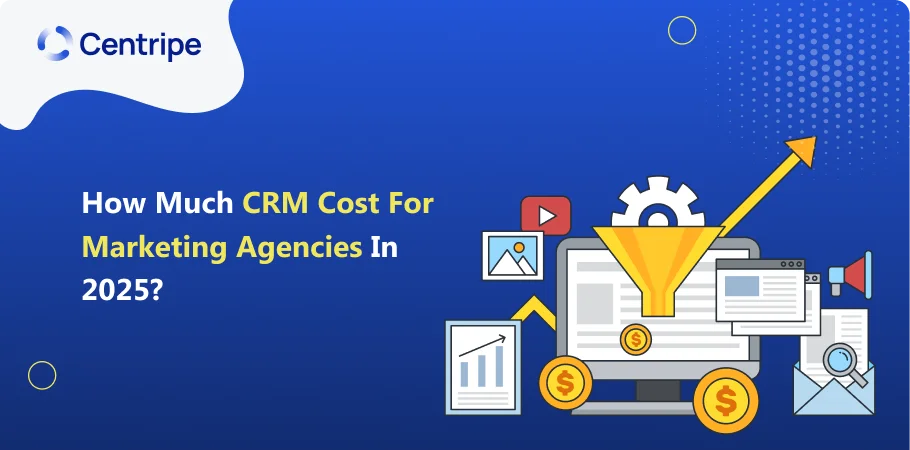When investing in a CRM application, the first question most marketing agencies ask is, “How much does a CRM cost?” Understanding CRM costs comparison is crucial when choosing the right tool for your business.
Customer Relationship Management (CRM) systems help organizations store, manage, and analyze customer data to enhance relationships and improve efficiency. With the rising importance of CRMs in streamlining operations and boosting client satisfaction, several vendors now offer varying features and pricing structures. But the core question remains: what does CRM software cost in 2025?
In this blog, we’ll break down the basics of CRM, we’ll also compare the various CRM software providers and cost comparison of popular tools to help you make an informed decision.
What Is CRM Cost?
CRM cost refers to the total expense associated with purchasing, implementing, and maintaining a CRM system. While the average cost of an enterprise plan for a CRM system in 2025 hovers around $67 per user per month, CRM prices can vary widely. Depending on the tool, basic plans might start at $15 per user per month, while advanced enterprise solutions could exceed $300 per user monthly.
CRM pricing structures often include factors like:
- Subscription costs: The core monthly or yearly fee based on the number of users.
- Add-ons: Optional features or integrations that come at an additional costs of crm software.
- Implementation: One-time fees for setup and customization.
- Training and support: Costs for onboarding your team or accessing premium support.
A clear understanding of these components helps marketing agencies anticipate their total CRM cost per month and avoid unexpected expenses.
Factors that Impact CRM Pricing
Several factors can significantly influence CRM pricing, making it essential for marketing agencies to understand these variables when selecting a CRM solution.
- Type of CRM Software: Different types of CRM software, such as those focused on sales, marketing, or customer service, come with varying price points. For instance, a CRM with robust marketing automation features might cost more than a basic contact management system.
- Number of Users: The number of users is a critical factor in CRM pricing. Larger teams typically require more licenses, which can increase the overall cost. Most CRM providers offer pricing on a per-user, per-month basis, making it easy to scale as your team grows.
- Level of Customization: Customization needs can also impact CRM pricing. More complex customizations, such as tailored workflows or unique integrations, often come with additional costs. Agencies should consider their specific requirements to avoid unexpected expenses.
- Level of Support: The level of support required can vary from basic email support to comprehensive 24/7 assistance. More extensive support options usually come at a higher price, so it’s crucial to assess your agency’s support needs.
- Industry and Size of Business: The industry and size of the business can also play a role in determining CRM pricing. Larger businesses or those in industries with specific regulatory requirements might need more advanced features, leading to higher costs.
Understanding these factors can help marketing agencies make informed decisions and choose a CRM solution that fits their budget and needs.
What Should Marketing Agencies Look for in CRM Software?
The essential first step involves determining which features your organization needs to use in CRM solutions. For marketing agencies, an ideal CRM implementation should:
Streamline project management: The platform enables perfect tracking of tasks along with the ability to designate responsibilities and automatic deadline fulfillment.
Centralize customer data: All client details should reside within a single accessible system.
Automate marketing tasks: Automation substantially changes the game by allowing organizations to send follow-ups and nurture their leads.
Provide insightful analytics: Organizations need performance insights about campaigns along with customer behavioral information to generate data-driven business choices.
Facilitate collaboration: Teams need accessible tools with real-time capacity to perform tasks seamlessly.
The Cost of the Top 10 CRM Software for Marketing Agencies in 2025
1. Centripe
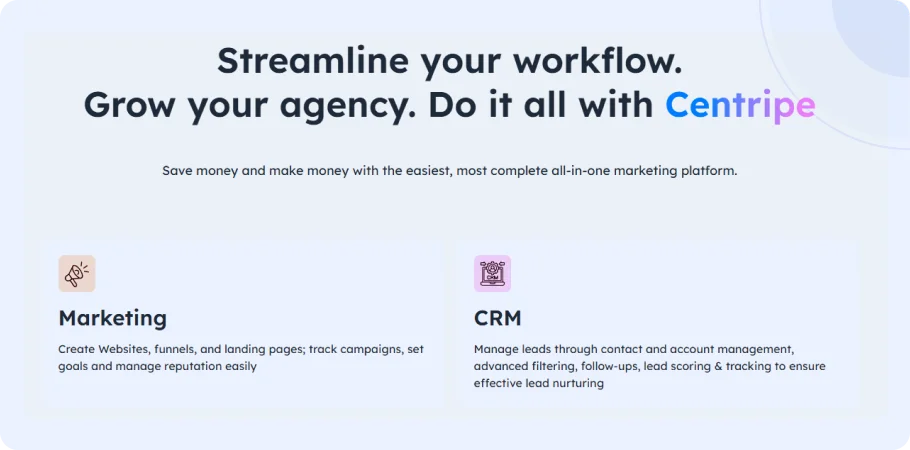
The top-tier CRM solution Centripe gives marketing agencies an integrated platform for automation management and sales optimization and client administrative processes. This flexible CRM system brings together all necessary capabilities including lead nurturing alongside customer experience tracking to serve agencies no matter their scale. Choosing the right CRM provider is crucial for ensuring that the platform meets your agency’s specific needs and budget.
The key differentiator for Centripe comes from its advanced analytics system which provides agencies detailed understanding of customer interactions. Servers and statistics features enable decision-makers to create better marketing plans through real-time dashboard panels alongside forecasting resources.
Features:
- Advanced analytics tools for in-depth campaign performance insights.
- Customizable dashboards to fit your agency’s unique KPIs.
- Lead scoring capabilities to prioritize high-value prospects effectively.
- Integrated email marketing for seamless communication.
- AI-powered automation to streamline repetitive tasks.
Pricing:
- Essentials: $99/month
- Unlimited: $299/month
2. Insightly
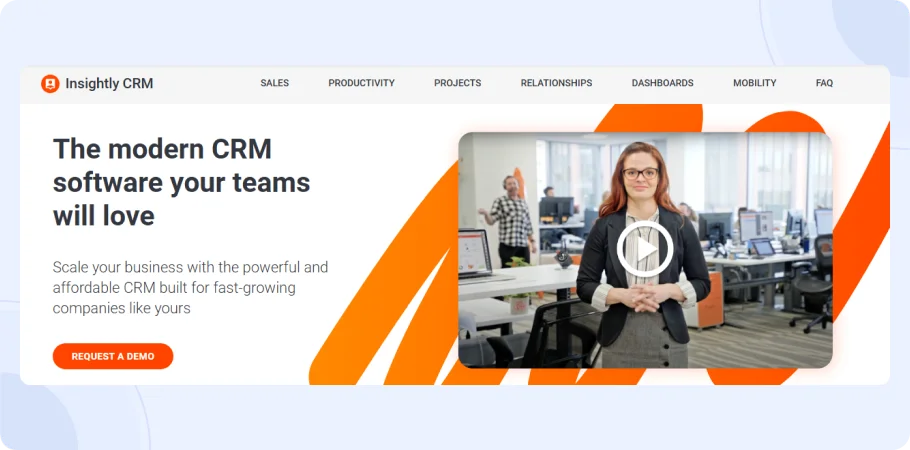
Insightly brings CRM alongside project management and marketing solutions in a unified platform which streamlines agency operations. Through Insightly agencies can simplify client email tracking and lead capturing while building better customer relationships.
The platform stands out because of its pipeline management system which specialises in fostering effective deal prioritization through organized client data processing. Users can benefit from visual dashboards that present metrics alongside automated routines which boost team productivity through the user interface.
Key Features:
- Combines CRM, marketing, project management, and sales functions
- Powerful sales pipeline and lead management tools
- Customizable dashboards for key insights
- Task automation for increased efficiency
Pricing:
- Plus: $29/month per user, including basic CRM features and email tracking.
- Professional: $49/month per user, adding enhanced automations and lead scoring.
- Enterprise: $99/month per user, offering advanced reporting and API access
3. ClickUp
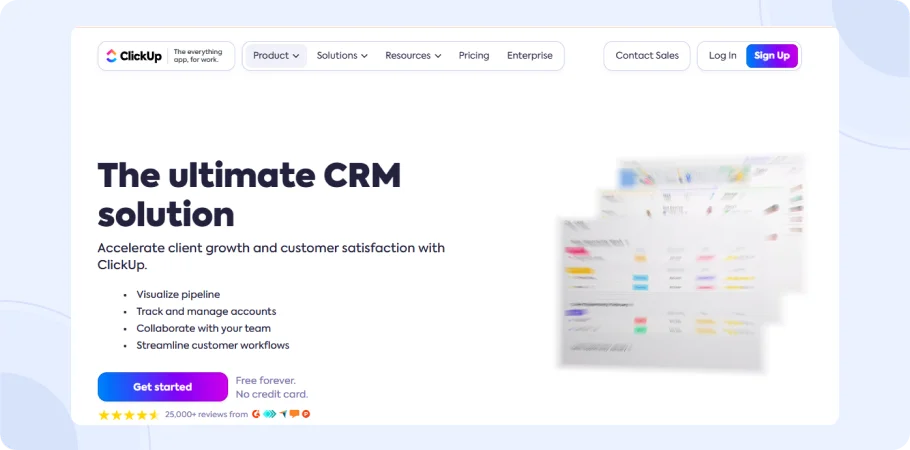
The CRM components of ClickUp provide remarkable features which align specifically with marketing agency needs. The program offers multiple visual organization styles which agency teams can use to view their tasks and pipelines from different perspectives including Kanban boards alongside list or calendar layouts.
The platform’s automation and email integration tools streamline client interactions. ClickUp forms simplify lead data collection processes along with automated email systems that handle client contact communication.
Key Features:
- Users benefit from marketing automation tools which help them complete their work at higher speeds.
- Performance dashboards with 50+ cards for data visualization
- Users with 15+ views receive tools for organizing their tasks together with their customer interactions.
- Email marketing tools for effective communication
Pricing:
- Free Forever: Includes basic task management and integrations.
- Unlimited: $7/month per user, offering unlimited storage and dashboards.
- Business: $12/month per user, adding advanced automations and integrations.
- Enterprise: Custom pricing with tailored support and security features.
4. Podio
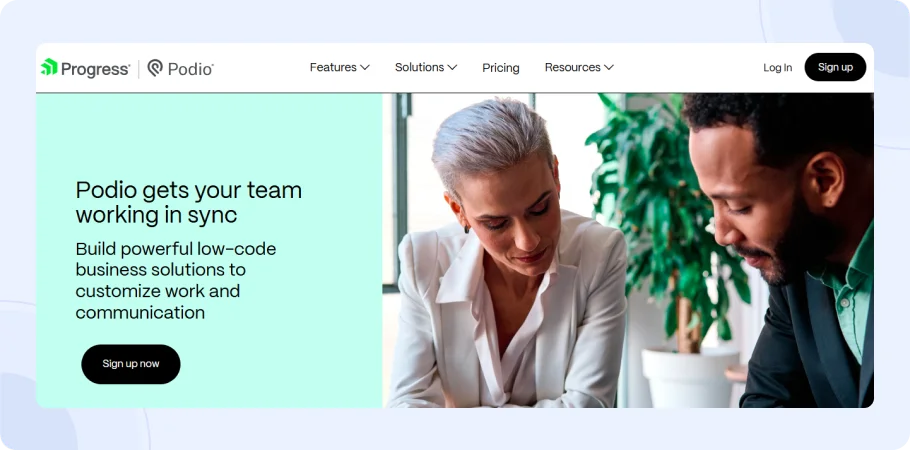
Marketing agencies gain flexibility to design personalized customer relationship management experiences through the Podio platform. The tool functions as both project and task management software yet offers specific capabilities for dealing with customer records along with lead information.
Agencies prefer Podio because of its native integration features. Through the integration of Google Drive and FreshBooks your agency can streamline operations by managing schedules for clients and sharing files and handling invoicing needs.
Key Features:
- Web forms serve as a tool to make client data collection automated through easy-to-use interfaces.
- Users can edit records in real time while adding files and creating comments to records.
- Multiple viewing options (List, Kanban, etc.)
- Wide range of integrations with popular tools
Pricing:
- Free: For basic task and client management.
- Plus: $14/month per user, introducing advanced workflows.
- Premium: $24/month per user, adding unlimited integrations and priority support.
5. Keap
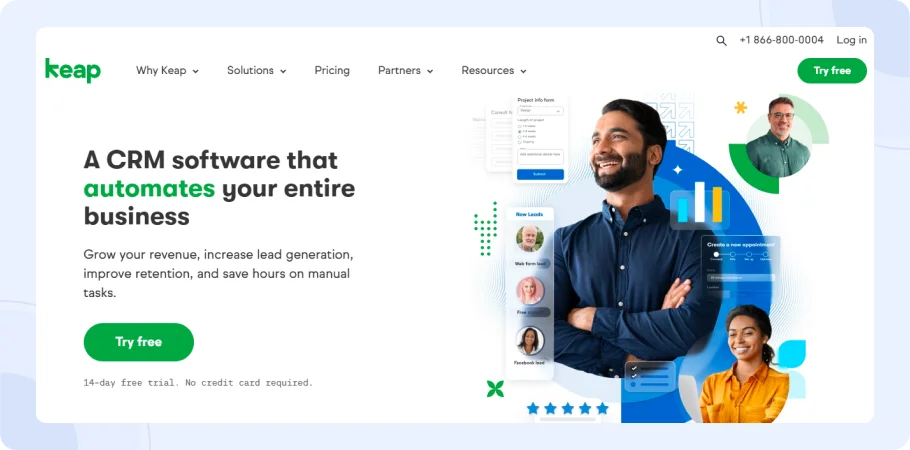
Keap caters to marketing agencies with a medium size customer base by delivering lead capture and billing functionalities. The platform uses automatic tools to collect lead data by processing information from forms and landing pages and social media applications.
One key capability of this system includes invoicing solutions linked with payment platforms which enable agencies to bill their clients from a single interface. With over 5000 connections available through Keap’s Zapier support, small businesses can gain exceptional flexibility for their operations.
Key Features:
- The system captures leads automatically while working across multiple contact points
- Seamless migration from other platforms
- Advanced payment functionality combines with invoicing solutions
- Over 5,000 integrations via Zapier
Price:
- Starts at $299/month for two users and 1,500 contacts.
6. Drag
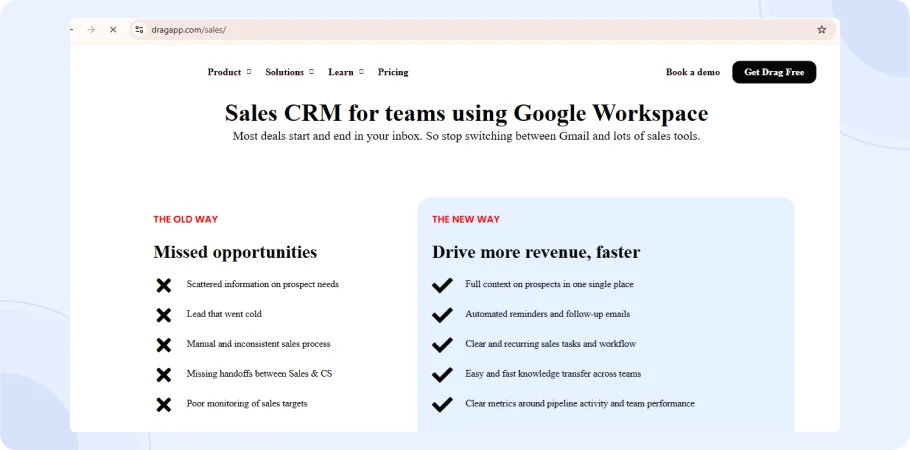
Drag lets you turn your Gmail inbox into a CRM solution that provides complete functionality. The platform gives agencies the ability to manage team inboxes and delegate tasks alongside tracking all interactions between customers and staff members directly from emails.
The platform manages email assignment and template follow-ups automatically which simultaneously increases productivity and prompts fast client interaction replies.
Key Features:
- Drag boards to organize leads and client inquiries.
- Automated email assignment based on sender and keywords.
- Comprehensive email templates for quick responses.
- Team collaboration tools for joint email management.
- Integrated file sharing to enhance communication.
Pricing:
- Free: Basic CRM features integrated with Gmail.
- Starter: $10/month per user, adding shared inbox functionality.
- Plus: $18/month per user, introducing automation tools.
- Pro: $24/month per user, providing advanced reporting.
7. SalesMate
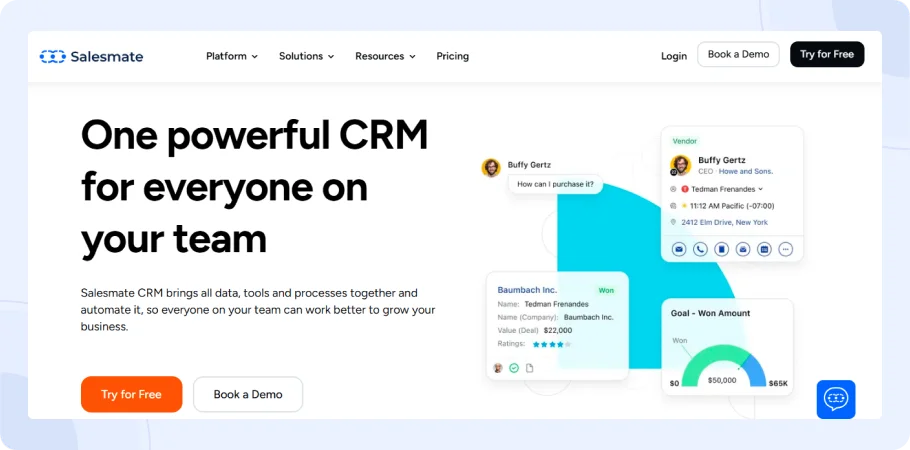
Agencies implementing automation can find their ideal solutions through the advanced features available in Salesmate. Users can access strong tools to manage leads together with prospects through functions including bulk emailing and personalized promotions along with auto tracking follow-ups.
Building workflows becomes approachable through Salesmate’s journey-based workflow automation builder. Your agency benefits from targeted workflow improvements through Salesmate’s extensive application integration which numbers 700 and beyond.
Key Features:
- Drag-and-drop automation builder for streamlined workflows.
- Real-time call tracking and recording to monitor client interactions.
- Customizable sales pipelines for better deal management.
- Bulk email campaigns for targeted marketing.
- 700+ integrations to extend functionality.
Pricing:
- Basic: $23/month per user, offering essential CRM tools.
- Pro: $39/month per user, adding automation workflows.
- Business: $63/month per user, introducing advanced analytics.
- Enterprise: Custom pricing with dedicated support.
8. PipeDrive
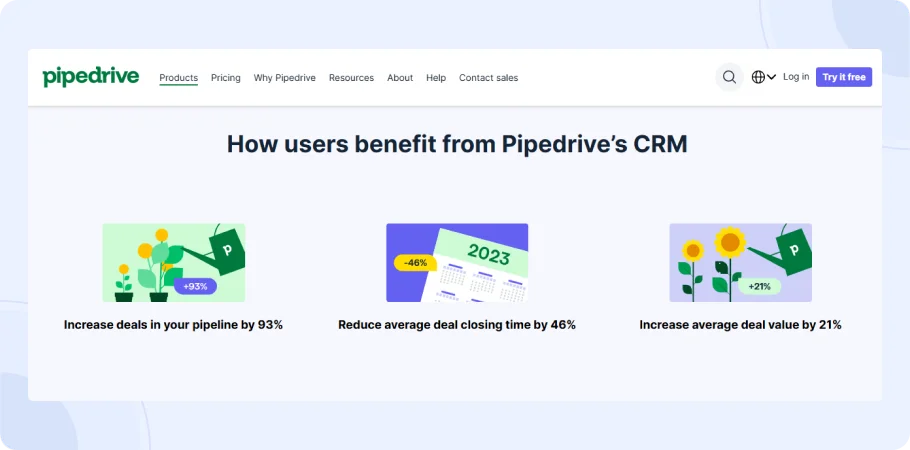
Pipedrive provides agencies a visualization tool to handle their sales pipelines within a sales-specific CRM setting. Using its graphical interface users can efficiently track deals through customizable presentation stages.
Through comprehensive analytics tools users gain access to performance results along with insights that reveal operational bottlenecks.
Key Features:
- Customizable sales pipelines for efficient deal tracking.
- Visual dashboards for monitoring KPIs.
- Automated email marketing to nurture leads.
- Drag-and-drop interface for user-friendly navigation.
- Integration with 700+ apps for extended functionality.
Pricing:
- Essential: $14/month per user, covering basic CRM needs.
- Advanced: $24/month per user, offering email integrations.
- Professional: $49/month per user, adding advanced reporting.
- Power: $59/month per user, including custom permissions.
- Enterprise: $79/month per user, with unlimited features.
9. Freshsales
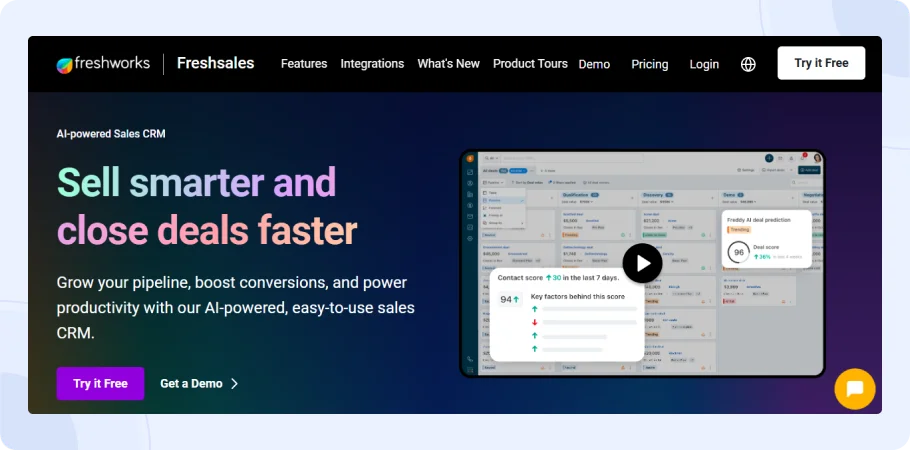
The main objective of Freshsales centers around delivering outstanding customer interaction throughout their platform. Users benefit from Freddy AI assistance while leveraging multiple visual pipeline views to generate actionable insights in addition to better lead management.
Through its API integrations Freshsales enables flexible integration with different sales forecasting agency processing methods.
Key Features:
- The system captures leads automatically while working across multiple contact points
- AI-powered assistant Freddy for deal prediction and performance monitoring.
- Customizable pipelines for lead management.
- API access for third-party app integration.
- Detailed reporting tools for actionable insights.
Pricing:
- Free: Basic CRM functionalities.
- Growth: $9/month per user, adding advanced lead management.
- Pro: $39/month per user, offering AI-powered features.
- Enterprise: $59/month per user, including premium support.
10. Monday CRM
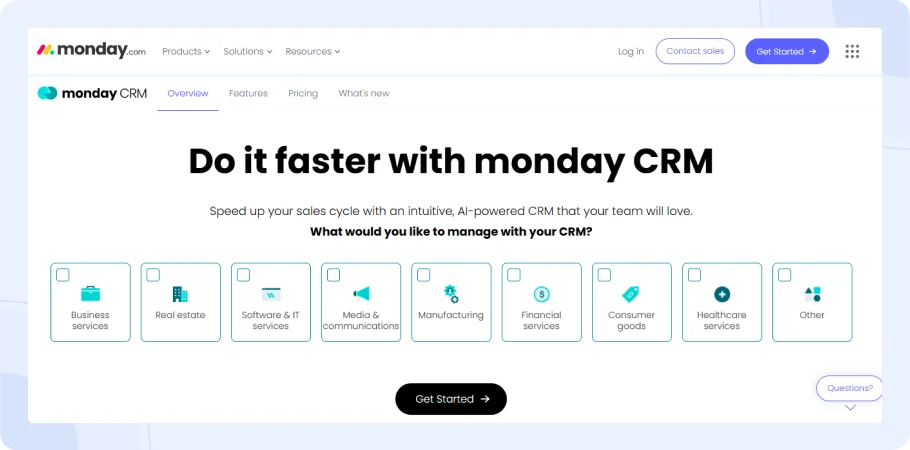
Through its integration of CRM and project management features Monday Sales CRM creates a process optimization system. Studio’s feature suite which includes data import alongside email tracking functionalities streamlines both client engagement and task organization.
Through its customizable dashboards Monday offers users the opportunity to track performance metrics as well as recognize business improvement possibilities. The platform’s integration capabilities with tools Slack and Zoom provide agencies with additional collaboration features which boost its versatility.
Key Features:
- Data import tools with duplicate detection.
- Email templates and tracking for better client communication.
- No-code automation for handling repetitive tasks.
- Mass email capabilities to improve engagement.
- Centralized dashboard for monitoring all client activities.
Pricing:
- Basic: $12/month per user, covering essential CRM tools.
- Standard: $17/month per user, adding timeline views.
- Pro: $28/month per user, offering advanced automations.
- Enterprise: Custom pricing for full customization and security.
CRM Cost Comparison
Here’s the table summarizing the pricing plans for CRM tools tailored for marketing agencies in 2025:
| CRM Company | Entry-Level Pricing | Mid-Level Pricing | Enterprise-Level Pricing |
|---|---|---|---|
| Centripe | $99/month | NA | $299/month |
| Insightly | $29/user/month | $49/user/month | $99/user/month |
| ClickUp | Free Forever | $12/user/month | Custom Pricing |
| Podio | Free | $14/user/month | $24/user/month |
| Keap | $299/month for 2 users | Custom Pricing | Custom Pricing |
| Drag | Free | $18/user/month | $24/user/month |
| SalesMate | $23/user/month | $39/user/month | $63/user/month |
| Pipedrive | $14/user/month | $49/user/month | $79/user/month |
| Freshsales | Free | $25/user/month | Custom Pricing |
| Monday CRM | $12/user/month | $17/user/month | Custom Pricing |
Conclusion
For marketing agencies, understanding CRM cost comparison is essential when selecting the right solution. With pricing varying from $7 to over $300 per user, it’s crucial to evaluate your agency’s specific needs and budget. Platforms like Centripe, Insightly, and ClickUp provide excellent functionality at competitive prices.
When assessing the cost of CRM software, always factor in subscription fees, implementation expenses, and add-on costs. This way, you’ll avoid hidden charges and ensure a smoother adoption process.
By making an informed decision based on a thorough CRM cost comparison, your agency can boost efficiency, enhance client relationships, and achieve sustainable growth in 2025.
FAQ’s:
1. Can small marketing agencies afford CRM systems?
Yes, many CRMs offer budget-friendly plans billed monthly, starting as low as $7/month per user, making them accessible for small agencies.
2. Do free or CRM subscription plans provide enough features for marketing agencies?
Free plans often cover basic functionalities like contact management and task tracking, but agencies may need paid plans for advanced automation or analytics.
3. How do CRMs handle data privacy and security?
Most CRMs comply with industry standards like GDPR, offering features like data encryption, user permissions, and audit trails to protect client information.
4. Is it difficult to switch from one CRM platform to another?
Many CRMs offer migration tools or support services to make switching easier, though the complexity depends on your current data and processes.
5. Do marketing CRMs integrate with advertising platforms?
Yes, popular CRMs integrate seamlessly with platforms like Google Ads, Facebook Ads, and LinkedIn to track campaign performance and optimize lead management.
